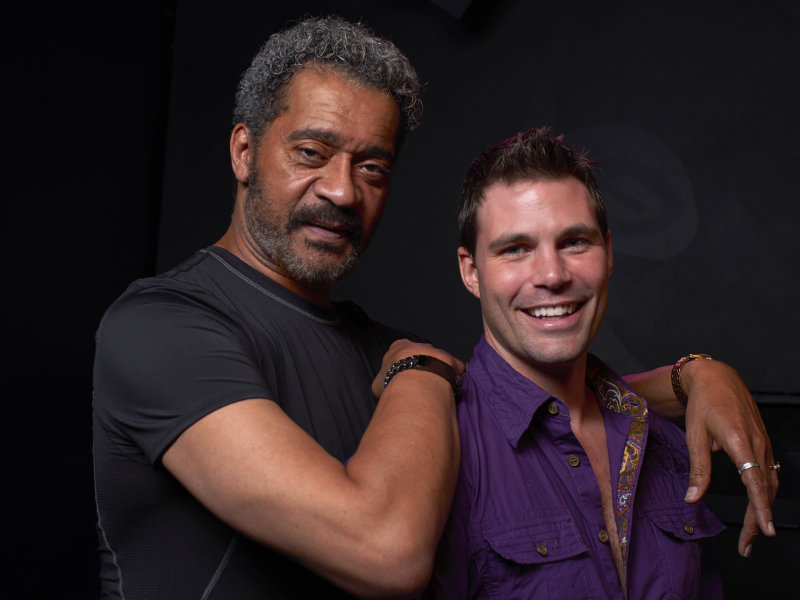Bay View’s Boulevard Theatre is used to pushing buttons and giving audiences the unexpected. It will continue in that tradition next week when they begin its 28th season with a performance of Robert Chelsey’s controversial play, "Jerker."
Actors Bill Jackson and Marty McNamee, along with Boulevard’s artistic director Mark Bucher, sat down with OnMilwaukee.com to talk about what has gone into staging and developing "Jerker," which premiered 1986 and follows the budding relationship between two men in the early years of the AIDS epidemic.
The cast was visibly more than a little nervous about how the play will be received. After all, Chelsey’s work is, to many, more infamous than famous – the original Chicago production featured gay porn stars, and in 1986 prompted the FCC to change its decency standards after it was aired on a California radio station.
The full name of the piece hints at the provocative narrative audiences can expect: "Jerker, or The Helping Hand: A Pornographic Elegy with Redeeming Social Value and a Hymn to the Queer Men of San Francisco in Twenty Phone Calls, Many of Them Dirty."
"The audience in Milwaukee is going to have an interesting time grappling past what they think the play is about," said McNamee, who plays businessman Burt opposite Jackson’s Vietnam veteran, J.R. "They’re gonna think that it’s about two people talking to each other sexually, when really it’s about the connection they have over a series of phone calls."
"That’s the thing about theater," agreed Jackson. "If there’s a lot of sex, it’s not about sex. If there’s a lot of violence, it’s not about violence. It’s what Hitchcock called the MacGuffin. It’s what moves the story ahead. ‘Psycho’ is not about the shower scene."
The play has only been performed once before in Milwaukee, over a decade ago by Theatre X, starring John Schneider and John Kishline. Boulevard’s performance will be a concert staging, with McNamee and Jackson reading the script from behind music stands. This, they hope, will allow the audience to focus more on the story and not be overwhelmed by shock at its explicit exposition.
"Even the more pornographic or profane sections of language, there’s a poetry to (the piece)," Bucher said. "They use sexuality to bond."
Does that mean this could actually be more powerful than the original version?
"If we can get the asses in the seats," said McNamee wryly. "What got the asses in the seats in Chicago was the gay porn stars."
Jackson feels that Chelsey’s play is suited to this kind of staging.
"It’s a too-frequently misunderstood practice in the theater," he said. "Many people think it’s just a low-budget performance, which it is, that is done instead of a fully staged production. There’s a place for both.
"Reader’s Theatre, that I studied at Northwestern University, exalts meaning that is generated by literature. The intimacy with the actor inspires a profound audience empathy. Actors who do this form of performance know that economy of gesture and facial expression, concentration, vocal prowess and other acting skills from the theater are greatly enhanced and therefore challenging to the actor. It certainly is to me."
"Jerker" will be performed at the LGBT Center, 1110 N. Market St. Bucher hopes that the play will address what he sees as a growing ambivalence of young gay men toward the severity of AIDS.
"What’s happening now with gay men’s health is a lot of younger men are thinking that an HIV (drug) cocktail will solve all their challenges, that we’ve lessened the crisis," he said.
For Jackson, who was living in Chicago during the early years of the epidemic, "Jerker" is a significant piece of historical fiction that brings back difficult memories. "When I first read this play, it scared the living God out of me," he said. "I was there when AIDS exploded in the United State. We were afraid to touch each other. This is an historical part of American culture and American theater because it was the birth of a plague. Gay people were the bulwark because gay people are targets, and were left to burn by what I consider to be an indifferent government that was hoping it would wipe us out. And it didn’t."
The sparse staging of Chelsey’s play and concert-reading setting mean that Bucher is pushing McNamee and Jackson to find and convey the meaning in every word, every pause and every punctuation mark.
"It’s like dissecting a piece of literature or a poem," said McNamee. "You find that there is meaning behind a period or a comma."
"This (play) actually is about the growth of a relationship, where you learn to care for these two people, and then you suffer with them," said Jackson.
"That’s classic in literature. If I don’t care about you, I don’t care what happens to you. What we’re getting from our director is you've got to make this audience understand with the tone of your voice the decisions you’re making, how your relationship goes from sex into genuine human connection, and then the consequences of offering your heart to somebody in the middle of a plague."
So bottom line – is Milwaukee ready for "Jerker?"
"I think that gay men can get through the exposition," said McNamee. "I think that their straight friends coming with them will have a hard time getting through it because of the things we say – but not the intention. And we have to acknowledge for a second that without plays like this, there would be no written history of the gay subculture. It’s not in any history books."
Colleen Jurkiewicz is a Milwaukee native with a degree in English from the University of Wisconsin-Milwaukee, and she loves having a job where she learns something new about the Cream City every day. Her previous incarnations have included stints as a waitress, a barista, a writing tutor, a medical transcriptionist, a freelance journalist, and now this lovely gig at the best online magazine in Milwaukee.







